Courting Courtès and the Commonwealth. High-profile diplomacy: With Brexit at the heart of the world diplomacy debate, The Bridge Magazine holds a timely interview with Celestine Ketcha Courtès, one of the world’s leading mayors.
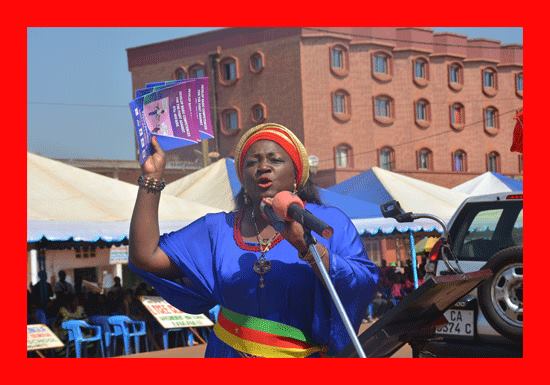
Academic excellence award: the Mayor of Bangangté, Mrs Ketcha Courtès , picturing books received from the Chantal Biya Foundation. The Bridge MAG. Image
After being among the 100 mayors of the world invited by United Nations Secretary Ban Ki-moon to discuss sustainable development goals, Celestine Ketcha Courtès shares her views on the Brexit aftermath with The Bridge Magazine, as well as some aspects of her professional and personal life.
Behind Mrs Ketcha Courtès’ blossomy smile is the focused mind of a charismatic, quick-witted and relentless bureaucrat with a strong sense of commitment.
Appointed President of the Network of Locally Elected Women of Africa (REFELA), Mrs. Celestine Ketcha Courtès has managed to shape up a world-class profile that has thrust her into the global diplomacy limelight.
The serial awards winner mayor is most known to have successfully represented Bangangté in West Cameroon in particular and Africa as a whole on the world stage.
-
Great expectations for Commonwealth countries
Former UK Prime Minister David Cameron’s ex-trade envoy recently emphasised that Great Britain should be doing more business with its “REAL friends and partners in the Commonwealth”. Similarly, Tamara Chabe later quoted Sir Winston Churchill in her article entitled ‘Brexit will allow Britain to embrace the Commonwealth’ as followed: ‘If Britain must choose between Europe and the open sea, she must always choose the open sea’.
-
Iconic figure – Bridging cultural bridges
Unlike Her Royal Highness of the Diallobé as mentioned by Cheick Hamidou Khane in his novel l’Aventure Ambiguë (The Ambiguous Adventure), Celestine Ketcha Courtès could be considered as a kind of queen in her own right.
Of hybrid culture she has not shied away from what her ‘ancestors loved and cherished the most: traditional customs and beliefs’. She is among those who have understood that an acknowledgement of one’s roots helps them to better comprehend the world in which they live and project themselves into the future.
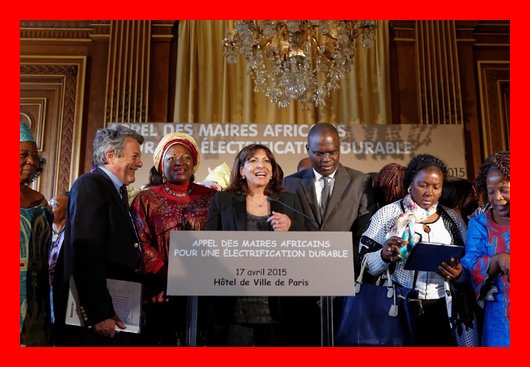
Paris. The Call of Mayors of Africa over renewable energy. Madam Mayor and President of Local Elected Women of Africa Network Mrs Ketcha Courtès, accompanied by other mayors responded to the invitation. The Bridge MAG. Image
-
Brexit: Did we really need it or not? This is an obsolete question. The Bridge Magazine is now addressing a fresh angle to the debate over Brexit.
The die is cast. Let us move on from the EU referendum. Cameroon/ Africa at the heart of Brexit.
– What do you think of the future of Cameroon in particular and Africa in general after the aforementioned statement of Sir Churchill, quoted by Tamara Chabe in The Telegraph?
I haven’t got the professional and technical awareness to provide you with a full comprehensive answer. However, I would say that the British population has made a democratic choice based on a vote.
According to the international trade and agreement law between Cameroon and the EU the same will no longer be apply to Great Britain.
However, nothing will prevent Cameroon and Great Britain agreeing on specific trade legislation on commodities for instance that suits them both. Since Cameroon is a member of the Commonwealth, I am pretty sure that the impact in medium- term will be almost unnoticeable.
Great Britain used to shine whilst an EU member, thanks to its empowerment over the rest of the world through the Commonwealth. By voting out, there will no longer exist the freedom providing that type of advantage to Britain any more.
-
You are Mayor of Bangangté, Mrs Anne Hidalgo, a close friend of yours, is the Mayor of Paris. Now there is Mrs Theresa May who succeeds David Cameron as Prime Minister of the UK. Is this a trend? Has the world of diplomacy been seduced by the woman’s way of governance?
Talking about gender, remember Mrs Angela Merkel is the German Chancellor. Just in case you haven’t noticed, Bangangté is also in active partnership with Germany who accompanies and assists us in improving our social skills and municipal investments.
-
What do you think about Mrs Theresa May being appointed prime minister in the United Kingdom?
Mrs Theresa May has been chosen by the Conservative party mostly for her skills and the trust the Tories have in her.
As President of REFELA and Champion of the United Cities and Local Governments (UCLG) Development Cooperation, we have made a plea to support at all levels in the preparation of the architecture post-2015.
We are campaigning for a greater involvement of women in management states at all levels. Mrs May is a woman –for that reason, I am delighted. For the next coming months, just like her Foreign Secretary Boris Johnson, May will be very busy negotiating Britain’s partnership with the EU, before devoting some time and energy to southern countries.
-
Tell us about your childhood, your adolescence, your best childhood memory.
I had a happy childhood, made of challenges. I was always eager to impress my father. Amongst many brothers (I was the only girl to my mother ) I had the privilege to be named after my father, “Ketcha”, and his elder brother, the Prince Ngongué Célestin.
In Cameroon, children do not automatically bear their father’s surname. One can name a child after a friend or a relative. My father use to be a civil servant and we frequently moved from one area to another, depending on the city he got appointed to next.
Our father was polygamous, so most of my siblings have been named after his friends and acquaintances. My mother found it absurd, arguing that it was pointless to name a girl after her father rather than one of the boys. Especially because women’s maiden names usually go unnoticed after they get married to a man.
Maybe she was right. But I have managed to prove her wrong by begging my husband to bear on our Civil Status both of our surnames combined, “Ketcha Courtes” – I am glad he agreed. Our two daughters are named after both of their parents, Ketcha Courtès. Also, the Ketchas, named after me in Bangangté are nowadays countless and I feel honoured.
-
What was your favourite toy or childhood and why?
I do not remember a particular toy or game as such. However, as already mentioned earlier, I was the only girl(to my mother) in my family. I then lost touch with girly leisure and was most skilled at boy’s games such as climbing up the trees. I grew up in a modest family.
I used to spend my holidays at my grandmother’s where I would comb the “silk” of a corn cob (the skinny pale hair-like structure) pretending it was a Barbie doll’s hair.
You didn’t need that much to be happy. But unfortunately, it was a short-term happiness because my father passed away when I was 14 years old. I was just about to commit suicide. That type of emptiness and disarray of the loss of a parent makes you feel dizzy and sick.
Our deepest condolences for your late parents.
-
Tell us about your academic / university background
The family scattered after our father’s death a bit of a mess in a sense as everyone went their own way. As a refuge from the storm, most of the girls found consolation in early marriage as if they were looking for a shoulder to cry on. I enrolled in a grammar school in Bangangté.
To prevent a forced marriage to a traditional chief by my grandfather King Njiki François, I ended up at a high school in Foumban (a major town for the Bamoun people in Cameroon) before going back to the Manengouba High School where I passed my A Level in Literature with German as a modern language.
I hold a Higher National Diploma in Business with Marketing as an option /special studies. I also graduated from ESSEC business school in Doula Cameroon.
Academically speaking, I completed all my studies and degrees in Cameroon.
-
Can we say your brilliant diplomatic career was mapped out from day one? Considering that you are not only a high ranking business woman but also that you graduated from a top business school.
Diplomatic career? I don’t know about that one. But I do agree with the fact that I make valuable suggestions that could make a huge impact for decentralization. I do pleas for the recognition of the ability of women to equal competence to perform the same jobs or functions as men.
I listen carefully in a bid to understand and work in order to meet people’s needs and move towards sustainable development. Once identified, effort and hard work are put together to find the resources to action. It is an arbitration job, a form of alternative dispute resolution mediation: it concerns local diplomacy, in a sense.
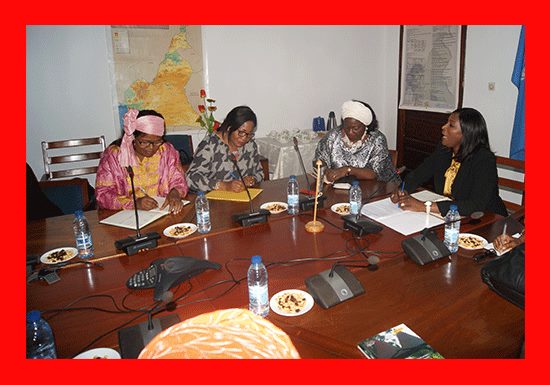
The President of the Network of Locally Elected Women of Africa and its members, gathered around Dr. Fatou N’Diaye former World Health Organisation (WHO) Representative in Cameroon. The Bridge MAG. Image
-
You were born to rule, born with a shepherd’s staff in hand, one may say. Tell us a bit about your job as the mayor of Bangangté as well as President of the Network of Local Elected Women in Africa (REFELA).
Born to rule? Maybe not. I grew up in an environment that has put constant pressure on me, urging me to prove people wrong and to convince them that I was capable of great achievement. Despite our father’s modest income he used to shelter children from other families in need, children with no relatives.
My job as a Mayor of Bangangté was for me a golden opportunity to improve the environment in which I experienced the death of my father. I use to walk a few kilometres a day to fetch water then 7 kilometres to travel to high school.
My function as Mayor of Bangangté was also an opportunity to thank our President, His Excellency Paul Biya, that I have been listening carefully for years now. I’m constantly helping out the population of Bangangté; the same goes with my function as President of Mayors for African women. I have never applied for that position but great was my surprise when I was chosen to lead such an important network.
-
What makes you laugh? What saddens you?
I’m just like everyone else. A good joke makes me laugh. In this mad world, it is great to welcome each opportunity of joy, to smile. The suffering or misery of children caught up by the vicissitudes of life saddens me.
Wickedness can either sadden me or make me laugh. I sometimes laugh at some bad people who display their ignorance and believe they could escape human, historical or divine judgment.
To a lesser degree, I witnessed some acts of violence during the 2008 protests in Cameroon. I was sickened to find myself in Bangangté in front of people setting tyres on fire as a means of protest.
-
Do you enjoy your job? Why?
Yes, as a mayor I enjoy to explain how decentralisation could benefit populations in the long run. The passion and drive I have for my job, hardly makes it look like a job I am getting paid for.

City Council in July 2016 the Mayor of Bangangté, Mrs Ketcha Courtès President of the Network of Locally Elected Women of Africa was welcoming the Prefect of Ndé, (West Cameroon) Mr Oumarou Wabi Haman. The Bridge MAG. Image
-
What are the most rewarding aspects of your various functions?
The mercifulness of people you help, the recognition of the impact of your help by the populations converted and proven by a percentage of more vote on your behalf each time.
For example, elected in 2007 with a score of 73%, we carried on the second term in 2013 with a remarkable increase in votes, to almost 86% against opposition parties. Despite the fact that other members of the opposition parties were unhappy, raising criticism over my dual nationality; being married to a Frenchman was a threat for some, but great was the surprise when the majority ignored that factor and voted for me once more.
The other bonus element in addition to national and international recognition is the support of my National President of the Cameroon People’s Democratic Movement (CPDM) Party and also President of the Republic, His Excellency Paul Biya. Highest authorities of the same Party such as Mrs Chantal Biya herself have been supportive as well. She was appointed Honorary President of the REFELA, Cameroon.
-
What are the main issues faced by Bangangté’s inhabitants?
There are still many, despite the efforts of the Municipal Executive I have the honour to lead. The main issues could be listed as follows: access to basic services such as water, sanitation, education, health care, improved access to road and transport, energy etc… As well as a private sector development capable of increasing our own local resources. These issues are fortunately listed and updated under the Borough Development Plan (PCD) placed on the borough site address as a priority.
http://www.communedebangangte.net
-
You always have a blossoming face. Tell us what’s your secret? How do you balance your family life with your diplomatic career, not to mention your other commitment as a high ranking business woman?
I experienced another sad event early this year. But sometimes when you are invaded by the pain and grief but then decide to put on a brave face to avoid bothering others. That is a bit how I have been brought up. Quite similar to the British way of dealing with personal issues isn’t it?
One of the advantages of the female gender is that we can do several things at once (multitask). Joke of course, but I strive for my family when I am physically present. If my work or political activities were to jeopardize my family life, I will be prompt to use arbitration.
-
Your best memory ? Your worst memory ?
The birth of my daughters. The worst is the opposite of birth: therefore the death of our father. I was traumatised and thought about committing suicide. I had lost my idol, the future was gloomy, full and dark with uncertainty. I felt the same way after my mother’s death, and my godmother’s, Mafeu Silikam’s.
Our deepest condolences once more.
-
The place of women, “the mothers of humanity ” to quote you, in governments, in society?
In Cameroon the head of state, President of the CPDM Party, by clear instructions at the eve of the last two elections, enrolled 30% of women in Municipal Councils for an even parity. With this gratified action, we went from a dozen women elected before 2007 to 24 in 2007 and 31 in 2013.
Thus an increase of 8% of the 374 Mayors and Representatives of Government in Cameroon and more than 30% Members of Parliament are women. There have been ten years of a strong increase in women with political responsibilities.

Christmas may have come and gone, but nursery children still remember toys from The Santa Claus Tour and Madam Mayor Mrs. Celestine Ketcha Courtès. The Bridge MAG. Image
-
Your vision for charitable activities.
Being prompt to provide help and assistance to the most in need is always our prime concern. I have always been impressed by anonymous donors with no political aims who donate in all discretion. I funded a Mbororo primary school for girls which was supported entirely by donations.
Few people are aware that most donors live in Bangangté and have requested to remain anonymous. My late mother was best known for her charitable activities. I paid tribute to her at her funeral by launching « La Case à la Table Ouverte de Maman Pauline ». Foundation in English the charity name could read The Open table at Mother Pauline’ house.
-
How do you spend your free time? Tell us about your leisure.
I no longer take time off to play golf or fly a plane. Time to time I take some time off for gastronomic tourism and to spend some quality time with my family. I also dedicate some time to seeing must see historical places with my daughters.
-
Your musical genre?
In terms of musical genre, I find country music particularly relaxing. In terms of a rhythm which makes you dance, I am still very attracted by the rock and roll.
-
Your favourite meal. Your favourite colour and why?
The condré dish typically from Bangangté. However, the Confit duck of south western France is also a very refined and tasty dish.
I haven’t got such a thing as a favourite colour, but I find charming the whole contrast of the green plant and red soil associated with the colour of gold.
-
What are your greatest efforts and what causes you more anxiety in your life?
The effort to improve the living conditions of the population with the support of our head of state as well as the Minister of Trade, Luc Magloire Atangana Mbarga. The fight for survival. Lies bring anxiety.
-
Tell something about yourself that would surprise most people.
Broadly speaking I am not a secretive person. But I remember a couple of years ago, a lady admitted on national TV that thanks to me she got close to her only daughter than ever before. In fact, I explained on TV my pleasure to be my daughters’ hairdresser.
The lady went on explaining how her daughter asked her why she need a hairdresser when the Mayor has time to style her own daughters’ hair.
The lady stopped dropping off her daughter at the hairdresser and their Sundays have become quality time between them. I also enjoy cleaning, sweeping, washing up. Unlike what some may think, I am also a mother and a woman who enjoys taking care of the house.
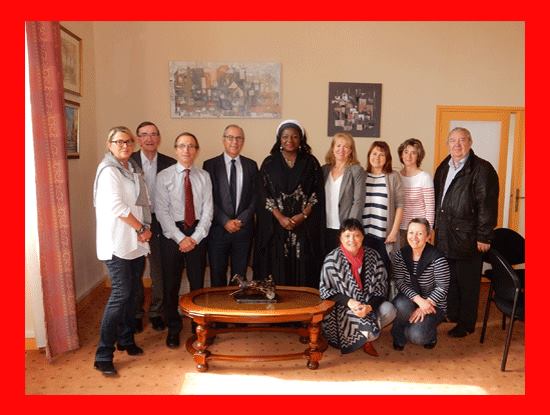
Mrs. Celestine Ketcha Courtès, President of Local Elected Women of Africa Network and Mayor of Bangangté surrounded by City Council partners. The Bridge MAG. Image
-
What do you plan to accomplish in the coming years?
I have important projects for my borough: a discharge or draining centre with a sewage sludge management service, first of its kind in Africa. The project to build a multisport stadium with private sector contribution, and Fecafoot, also with the support of a US Cameroonian elite diaspora.
To build a town hall for our borough that matches expectations of a City that has received Feicom 1st Prize of Best Borough of Local Development, the United Nations Public Service Award.
Another project to consider is to build a central market with German cooperation and many other small projects close to the populations needed, such as public washing machines, public parks and green spaces for walks and relaxation; a solar lighting system etc…
-
Do you have a political idol, an inspirational figure?
Of course this is our head of state, His Excellence President Paul Biya .He is a man of peace. He is calm, knowledgeable, patient, wise, humble; I must stop. My female idol is Simone Weil who represents women with a strong desire to succeed.
My late mother inspired me with her endless generosity.
-
The issue of drinkable water will always remain crucial even in the main cities of Cameroon, and Africa as a whole. How did you manage to overcome the challenge to quench the population’s thirst in the villages of the Bangangté borough?
I was elected head of the municipality in 2007, I found in a draw an amazing project initiated by the National Participatory Development Programme. The project clearly highlighted that for 23 of the 25 sectors analysed, people’s first priority was access to clean water. During six months we appointed two engineers from the Polytechnique of Yaoundé to refine our understanding and better quantify the issue.
We then look for possible partnerships. The government was welcoming at the time any initiative to establish direct relations of cooperation in favour of the ongoing decentralization.
We managed to meet the Veolia Foundation through an elite diaspora, then we integrated the Association of Francophone Mayors. We collected funds and had access to AESN and SIAAP , and the project (MODEAB) of Mastering Water Distribution in Bangangté was born. The funding coming from these organizations was more than a billion cfa (The basic monetary unit of Cameroon, Congo, Gabon, and the Central African Republic, equal to 100 centimes).
Cameroonian government valuable contributions was taken by a decision of the Prime Minister to allow a tax-free investment for the project. We were then able to rehabilitate the scan water network within 6 Common inter-municipality of the borough of , Bangou . We implemented a mini solar array Sanki and build ecological toilets in schools and markets.
The most important was the consistency of structures implemented in particular in terms of the Public Service of Water and Sanitation of the Environmental Education Committee. The project now has an extended contract with SIAPP for sanitation with a Stuffing Centre , the first of its kind in Central Africa.
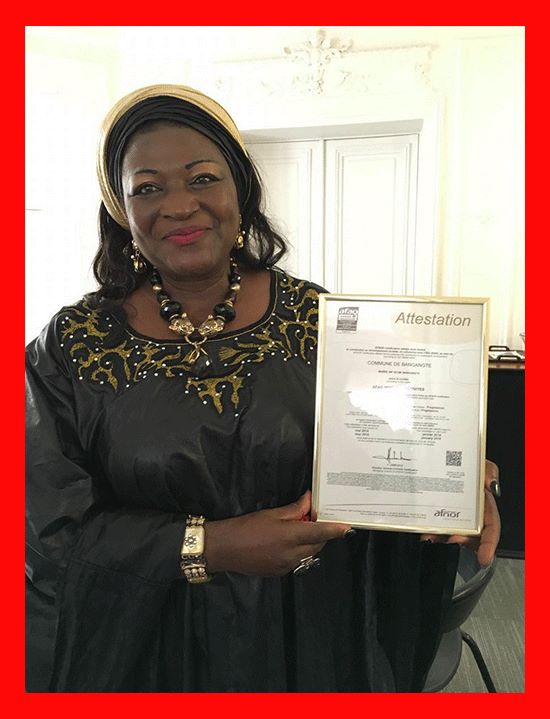
President of the Network of Locally Elected Women of Africa (REFELA) and Mayor of Bangangté , Mrs. Celestine Ketcha Courtès has managed to shape up a world-class profile that has thrust her into the global diplomacy limelight.
The Bridge MAG. Image
-
You’re undaunted by challenges, relentless with the desire for perfection one might say. You want to achieve more that just being the Mayor of NDE department (in the West Region of Cameroon).
Your dynamism makes you collect national and international awards including: Best Common Feicom 2012; UN Prize in 2014 for Public Service; second best town in Africa 2015. The list is not exhaustive.
What other awards have you recently received?
We have seen the benefits of a great diagnosis in 2007 with the PNDP analysis. We chose to recommend the municipal team to an audit department aiming for an ISA certification 26,000 on a societal approach. The outcome was last June.
Bangangté scored 480 and achieved its certified ISO 26000 (the ISO 26000 is a diagnostic tool that highlights sustainable development axes for the wellbeing of populations). This is a plan to rely on for the months and years ahead. We will still make a contribution, or appoint two young higher education graduates to refine our business plan to better serve our people.
With commitment that comes with the laws of decentralization, as intended by the head of state and the Minister of Territorial Administration, one can no longer become Mayor just for the sake of it.
We were a bit worried when the verdict of AFNOR was still pending. We are now proud of the result. We are motivated for the future.
-
You often appeared wrapped in traditional and regal costume, with Western Cameroon jewellery. Tell us about your traditional responsibilities as Queen Mother of Bangangté.
Cameroon has that singularity of a Republican power interlinked with the uses of Tradition. The Traditional Chiefs held court for centuries for the common interest of their peoples. This is in perfect harmony with the responsibilities of elected officials of the Republic. I am the granddaughter of Bangangté, Superior Chief who reigned from 1912 to 1943.
I am an elected representative of the Republic. The Republic helps me through its academic system to be trained and therefore to use that knowledge to land a job and become manager. I am proud of my country with its Republican and Traditional components. I have never been confused or at the heart of a dilemma between our ancestors, traditions and beliefs and our Republican life.
Wearing my traditional costume enables me to emphasize once more the beautiful harmony between the power of tradition and modernism. It will be time consuming to talk about the life of the Queen Mother in detail. However, the Queen Mother’s prime role is to mediate and resolve tension and issues that inevitably may have occurred between people of the same cultural community.
-
After winning the hearts of Paris and New York, it will undoubtedly be the Mayor of London very soon. As it were, Madame Mayor has more than one string to her bow. Are you ready to work with the Mayor of London?
The Mayor of London is from a diverse background. It will be a pleasure to meet him. I am not sure if he would like to cooperate with the developing countries like Anne Hidalgo, the Mayor of Paris. I don’t think I seduced Paris and New York. But it is true, I have the privilege to see Anne Hidalgo quite often, and we get on really well.
Those major cities are crucial when it comes to a decentralised collaboration. We still consider to work in partnership with little cities as well though, such as Fouesnant in the French west, and also Muntsingen in Germany.
Thank you very much Madam Mayor for opening up to The Bridge Magazine.


 (4 votes, average: 4.75 out of 5)
(4 votes, average: 4.75 out of 5)
Dear Gladys,
Many thanks for your comments and for your kind words. Our webmaster and designer have the awareness to provide you with a full comprehensive answer regarding the programming side of our Online Magazine.
They will be in touch with you shortly.
Kind regards,
The editor,
Dear Matis,
Impressive indeed. She has such passion and drive.Bless her.
Many thanks for taking time to read and drop constructive comment.
Much appreciated
Kind regards,
The editor
Dear Orellana,
I am delighted to know that The Bridge Magazine is one of your online favourite news feeds.
Kind regards,
The editor